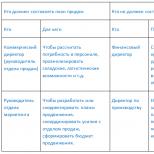How to write a resume
Which section of your resume do you think is the most important?
Poll Options are limited because JavaScript is disabled in your browser.
In this article, you will find a step-by-step guide to writing a resume, as well as tips and examples that will help you draw attention to your person, stand out from the competition and land a competitive position, no matter what your specialty is.
Compiling a resume is not inherently difficult, it is important to write it in such a way that you stand out from your competitors quite brightly, and this is worth some effort.
For the most part, resumes look the same, of course there are some rules, but you also need to impress, and for this, train yourself to have an individual handwriting. After all, 90% of your competitors will speak standard phrases from which employers are tired, even you are likely to say them:
- A responsibility
- Punctuality
- diligence
- perseverance
- Sociability, etc.
This is what is expected of you if you want to stand out from the competition - you need to hook and interest the employer, then you will get an advantage and will be deservedly rewarded. A well-written resume really deserves attention, and if you carefully study the material on this site, make a correct and catchy resume, then it will be put in a separate folder and shown to the boss in the first place!
Soon you will learn powerful rules to apply...
First Rule: When writing a resume, imagine that you need to sell the most expensive thing for you (yourself, of course). Make the employer need you, prove that you are an expert in a certain area and this area is extremely important to him. It is important to understand that your expertise matches the position for which you are applying.
Believe! This rule has been working for many years, and if done correctly, perhaps this will be enough. Although ... this is only the first rule.
What is the main purpose of a resume?
A resume is a business card, your personal, professional self-esteem, the task of which is to profitably sell you, or rather your experience, knowledge and skills, in order to obtain a pre-planned result. Think about these words!
The summary should be made on the basis of several rules, stick to them and you will succeed in obtaining a profession, and in the future, a career:
- brevity. The resume should not be very large, on average, reading the resume takes about a minute of time, often even less. The optimal size is one A4 page.
- Concreteness. Try to be as clear as possible in dates, names, addresses. You will give the impression of a business person who approaches tasks with responsibility.
- Truthfulness. There are times when you want to embellish reality. Do not write a lie, sooner or later it will be revealed, and you will have to be punished.
- Selectivity. Select information for your resume, include exactly those aspects that will be useful in the position you are applying for.
The most clearly marked are those areas that people look at first, i.e. this place should contain information that will draw the attention of the employer to your person. The procedure for writing a resume is described below.
Second Rule: The more clearly you can formulate your goal, the more attention and professional interest you will attract. A person who knows exactly what position he needs and what skills he has already deserves attention. It is also desirable to indicate the level of wages.
Order of writing resume sections:
The appearance of the resume should be pleasing to the eye and not contain unnecessary elements on the page! What matters is the presence of your photo and a clear structure:
- Personal data- Full name, Date of birth, Place of residence, Phone, E-mail.
Ivanov Vitaly Andreevich
Date of birth: 07/24/1980
Place of residence: Yekaterinburg, st. Bolshakova, 77–419.
Phone: 8 XXX XXX-XX-XX (mobile), XXX-XX-XX (home).
Email: [email protected]
- Target- In this paragraph, write what vacancy you are applying for. You must know exactly what you want! Moreover, this is the most important part of your resume!
Target, or life achievements- focus on this part of your resume, it should be exciting and understandable so that the reader wants to meet you live. This part should be located at the top of the resume under personal data.
- Education– Indicate the basic education that allows you to apply for this position. Indicate the years of study, institution and qualification (specialty). Also voice additional courses or trainings, but only if they are related to the vacancy.
2002 - 2007
Ural State University A.M. Gorky
Faculty: Historical
Specialty: Historian-archivist
Additional education:
2003 Ural-Siberian Institute of Business
Program "Integrated Marketing"
- experience– List the most recent jobs, starting with the most recent (current). Indicate the period of work, company name, field of activity, position and responsibilities, as well as specific achievements in indicators.
March 2009 - Present.
Company: West
Field: Wholesale of food products
Position: ch. accountant
Responsibilities: Maintaining accounting and tax records, preparing reports for the FSS, IMTS, work in the general taxation system.
etcBasically, the section resembles a work book, pay attention to this item and you will get an advantage. Do not list non-essential experience that is not relevant to the job! Compose it with due attention and get a return
- Additional Information- this item is not mandatory, but it can affect the final decision. Indicate skills relevant to the purpose of the resume - language skills, computer skills, occupational programs, etc.
PC: Word, Excel, PowerPoint, CorelDraw, PhotoShop.
German - fluent, English - colloquial.
In the main (the most readable part) - describe the significant events that have occurred in your professional career, what level of skill you have achieved over the past years and in what areas you are deservedly considered an expert. Write how you differ from other experts, maybe you have awards, make the manager read your resume to the end!!!
How to impress a recruiting manager?
Before answering this question, let's take a look at what a manager's job looks like and the tasks that he must complete to select candidates.
- Compose and post job advertisements.
- After a sufficient number of resumes sent, candidates need to be weeded out and the best ones selected for calling and questioning.
- After the call, some of the candidates will be screened out again, and the rest must be invited for an interview and the best ones will be selected again.
- And the last interview, perhaps already practice, will be in the department where the employee is required.
Don't be scared! You can attract attention to yourself if you compose a resume of high quality. First you need to get to the interview, and for this you need to follow these steps:
- Approach writing a resume seriously, devote a lot of time to compiling. Make up two options and send them together if you can't decide.
- You should have a presentable mailbox, with your last name best (do not use mail like: [email protected] etc.)
- Try to use understandable language, do not use too abstruse or formulaic phrases, no one reads them! Tell the professional story of your career - that's all you need.
- Divide your resume into its component parts, and make the main information more visible, but at the same time, do not overdo it.
- Do not make multipages with complete information about yourself, the resume should be on 1 A4 page (maximum 2)
- Phone the employer, if possible, find out if the resume has reached and how soon the result will be known.
Third Rule: Be confident! Everyone gets nervous at job interviews, even employers. You should personify a confident person and inspire calmness with your appearance, and not the feeling that you are ill. How to achieve this? There is one way! But you will learn about it in the next article.
Here are a few tailor-made resumes that will attract the attention of the employer, but you must clearly understand how this will affect the attitude towards you. In some cases, creativity is appropriate, in others it is not.






